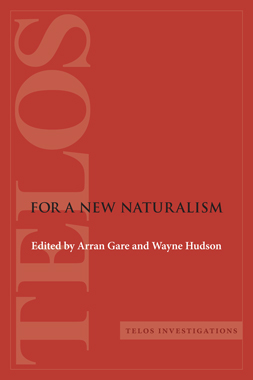The art of scandalizing is inexhaustible. In Kant’s Anthropology, there are a few remarks familiar to anyone who has studied Kant. According to the standards of the spirit our time, one could characterize those as racist. That media attention can be sparked from this today is known since the leveling of similar accusations at Shakespeare and Mark Twain. Hegel praised war, Nietzsche proclaimed the necessity of slavery, the hypersensitive Walter Benjamin made use of the word “gypsy.” One could endlessly extend the proscription list of scandalous thinkers. For the block warden of thought, there is really not a single great mind before 1968 with whom some racist, militaristic, or misogynistic remark could not be substantiated.
|
For a New Naturalism, edited by Arran Gare and Wayne Hudson, is now available from Telos Press in our online store. Order your copy today and save 20% on the list price by using the coupon code BOOKS20 during the checkout process. Contemporary political and social theory needs to be rethought with reference to posthistorical conditions and developments in the natural sciences. More emphasis needs to be placed on a wider naturalism that goes beyond modern objectivating naturalism: a naturalism that opens up to both differential naturalisms and to differential humanities. In place of critique without concrete alternatives and American identity politics, a version of enlightenment is needed that stands for the rational reform of human affairs in all areas. This enlightenment is not the mainstream European Enlightenment of the eighteenth century. It is not hostile to indigenous and premodern social traditions, but seeks to learn from them. Nor is it confined to Western social thought or to a political thought based on the citizens of cities. This enlightenment engages with the sciences and with global historical dynamics. The following paper was presented at the conference “After the End of Revolution: Constitutional Order amid the Crisis of Democracy,” co-organized by the Telos-Paul Piccone Institute and the National Research University Higher School of Economics, September 1–2, 2017, Moscow. For additional details about the conference as well as other upcoming events, please visit the Telos-Paul Piccone Institute website. Theodor Fontane, the master of German realist fiction, published his first novel, Before the Storm, in 1876. Set during the winter of 1812–13, in and around Berlin, it explores the decisive historical moment when Prussia changed sides—breaking out of its forced alliance with France in order to side with Russia in the anti-Napoleonic war. Yet the dialectic of the moment was such that Germans could join in the rout of the French while nonetheless embracing aspects of the French revolutionary legacy. Thus near the conclusion of the novel, the Prussian General von Bamme, commenting on social changes around him, a reduction in traditional structures of hierarchy, speculates, “And where does all this come from? From over yonder, borne on the west wind. I can make nothing of these windbags of Frenchmen, but in all the rubbish they talk there is none the less a pinch of wisdom. Nothing much is going to come of their Fraternity, nor of their Liberty: but there is something to be said for what they have put between them. For what, after all, does it mean but: a man is a man.” Mensch ist mensch. Telos Investigations is a new book series that collects papers delivered at Telos-Paul Piccone Institute conferences. The first volume in the series, For a New Naturalism, edited by Arran Gare and Wayne Hudson, is now available for purchase in our online store. Save 20% on the list price by using the coupon code BOOKS20 during the checkout process.
Adam Smith is usually remembered as a champion of commerce. But as a moral philosopher he understood that even as commerce inculcates the virtues of industry, frugality, and temperance, it also inculcates vices such as avarice, envy, and short-sighted self-centeredness. Smith recognized that good government requires virtues such as honor, moral rectitude, patriotism, magnanimity, and a far-sighted perspective, to which the commercial vices are fairly opposed. Smith considered this a problem in his own day, as Great Britain was threatening to become a nation of shopkeepers, ruled by classes trained not in statesmanship but in commerce, governed not by codes of honor but by self-interest. The problem has resonance today as well. In his account of the impact of Islam on Europe, Michael Ley pulls no punches, especially for all those readers, like the present reviewer, who still hope that a Muslim humanism and not Islamist terrorism will become the primary social movement in global Islam in the years to come. In a nutshell, Ley’s main theses are the following: Orthodox and radical Islam are the scourge of humanity. Ley calls Sharia Islam “the worst danger for democracy and human rights in the 21st Century.” Only an Islam without Sharia is compatible with human rights. Yet that is a vision for the future; current reality, according to Ley, is different. The Islamization of Europe is, according to Ley, the most visible change in most European societies. While liberal and educated citizens consider the increasing influence of conservative and radical Islam with great concern and regard the future of the continent as rather bleak, their so-called progressive opponents interpret the ongoing Islamization as a cultural enrichment that contributes to the historical overcoming of the obsolete nation-state. Ley goes as far as to say that today the pioneers of radical post-national Europe would prefer to abolish all symbols of national identity: indigenous Europeans should waive all national, cultural, religious, and ultimately also traditional sexual identities. |
||||
|
Telos Press Publishing · PO Box 811 · Candor, NY 13743 · Phone: 212-228-6479 Privacy Policy · Data Protection Copyright © 2024 Telos Press Publishing · All Rights Reserved |
||||








